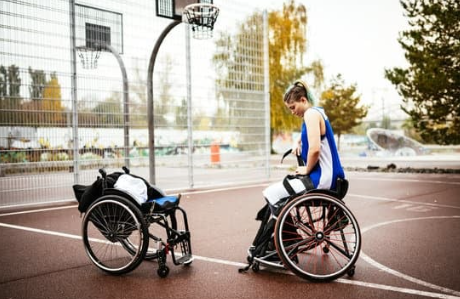Sporting Pathways in Rehabilitation: Inpatient Programs Boost Post-Discharge Physical Activity for People with Brain and Spinal Cord Injury
A study involving Hopkins Centre researcher Dr. Emily Bray, in collaboration with a multidisciplinary team comprising Hannah Daniel, Dr. Emma Beckman, Dr. Elise Gane, Associate Professor Melissa Kendall, Glenn Verner-Wren, and Professor Timothy Geraghty, has demonstrated the significant role that inpatient sport programs can serve in offering individuals with brain and spinal cord injuries a sense of social connection and enhanced wellbeing.
Published in Disability and Rehabilitation (2025), the study — “Evaluation of an inpatient sports program to guide post-discharge physical activity participation among people with brain and spinal cord injury” — highlights the importance of embedding sport and recreation opportunities into rehabilitation settings.
Key findings 
- Positive influence of inpatient programs: Participation in organised sports and recreational activities during inpatient rehabilitation enhances patients' mental health and wellbeing, and supports functional improvements.
- Barriers to follow-through in the community: Engagement in sports and recreational activities during inpatient rehabilitation did not translate to continued participation at three months post-discharge, with barriers including personal priorities (e.g., spending time with family, returning to work), health, and knowledge of access.
Why this matters
For people with acquired brain injury (ABI) or spinal cord injury (SCI), staying physically active after rehabilitation is essential for physical health and emotional wellbeing. However, many encounter barriers such as limited information, confidence issues, or a lack of accessible options within the community.
This research demonstrates that the introduction of inclusive sports and recreational activities in hospitals can support not only functional improvements but also social connections and quality of life.
Translating research into practice
The insights are highly relevant for rehabilitation services, clinicians, and policymakers. By integrating sport and recreation into inpatient care, services can support social connections and promote emotional wellbeing during hospitalisation. However, it is imperative to consider sports and recreational activities in discharge planning, ensuring that goals related to these activities are supported following transition into the community. Additionally, reinforcing collaborations with community sport organisations may promote more seamless transitions into sports and recreational activities following discharge.
Acknowledgement
Metro South Health Research Support Scheme for funding this project (2022 Novice Research grant) and to the University of Queensland, The Hopkins Centre, and Sporting Wheelies for their support. The research team would also like to thank Dan Morris, Anthony Williams, Janelle Gesch, Emilie Gollan, Kara Retford, Sue Stevenson and Table Tennis Australia for their support.
Chef investigators – Hannah Daniel and Dr Emma Beckman
Principal investigators - James Richarson, Dr Elise Gane, Associate Professor Melissa Kendall
Associate investigators - Dr David Borg, Glenn Verner-Wren, Peter Tonks, Jai Peach, Associate Professor Sean Tweedy, Kathyrn Smith, Dr Megan Ross, Professor Tim Geraghty, Emily Bray
Tags: Brain Injury, Spinal Cord Injury, Sport, Rehabilitation
Related Articles
- Bold Ideas Better Solutions Symposium 2017
- World-leading centre for rehabilitation and disability research opens
- Improving the ability of employers to communicate with brain injured workers
- Making breathing easier for patients with acute spinal cord injury
- Singing as a form of rehabilitation

